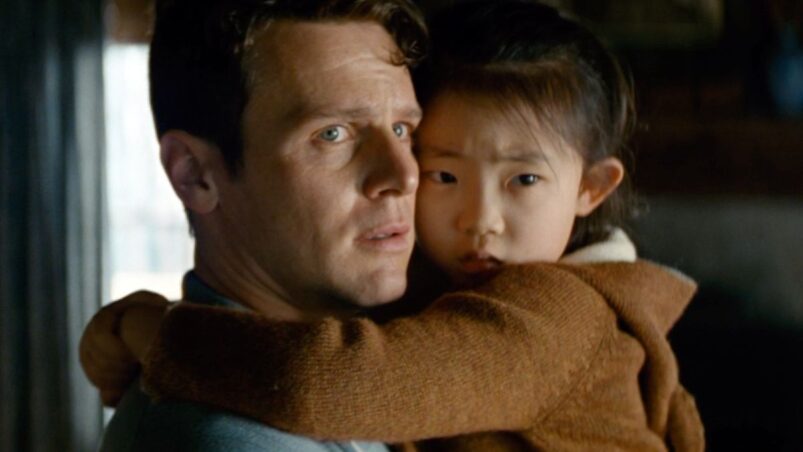
Every Easter, I tackle a film or book that deals with themes of the season, or has a setting that occurs around that time of the year. There was Scorsese’s Silence in 2019, Chocolat in 2020, Steel Magnolias in 2021 and Signs in 2022. Perhaps it seems like bias to choose a M. Night Shyamalan film two years in a row, but the themes of Knock at the Cabin lend itself so well to the season that I just couldn’t resist.
Knock at the Cabin requires a family of three to make an impossible choice: sacrifice one of their own to stop the apocalypse and save the world. As the movie plays out, we’re not sure whether these four individuals who pay them a visit are legitimate or some kind of doomsday cult. While we’re meant to be second-guessing these visitors and their motives, it’s hard not to believe them when the actors do such a fantastic job of selling their sincerity. Every single time the family fails to make a decision, one of the four is sacrificed. It’s clear to see that these four messengers are modelled from the four horsemen of the apocalypse – Conquest, War, Famine and Death – except that they present the inverse.
Leonard never sought conquest, only brought guidance as a teacher. Redmond certainly stirred conflict by starting the fight with Andrew in the bar years before, but looked truly remorseful as he pleaded with them to look at him before his death. Adriane feeds the hungry, and Sabrina is a nurse who helps heal the sick and steer them away from death. They represent all sides and facets of humanity. Towards the end of the movie, as the world falls apart around them and the four horsemen lie dead, Eric knows what he must do. Between Andrew and Eric, Eric has always been the believer, while Andrew is the skeptic.
Just before Redmond’s death, Eric saw a figure in a pool of light – it’s hard to say if what he saw was real or the result of his concussion. Nevertheless, that image comforts him, and helps him make a decision that would benefit his daughter and family. He doesn’t want his daughter to grow up in a wasteland, and to walk the earth alone when he and Andrew have passed on. That is the reality if they stay passive and let humanity be destroyed. The apocalypse is thus prevented because of a father’s love.
This ending is different from the one in the book. In Paul Tremblay’s novel, the characters resist until the end, refusing to dance for a higher power they view as malevolent – why else would he demand something so horrific? What kind of God would desire such a sacrifice? Even in the story of Abraham and Isaac, God didn’t require Abraham to go through with the sacrifice – it was a test of his faith and obedience. The bible also makes it clear that human sacrifice isn’t something God condones. In the book of Deuteronomy 12:31, it states: “You shall not worship the Lord your God in that way, for every abominable thing that the Lord hates they have done for their gods, for they even burn their sons and their daughters in the fire to their gods.”
However, sacrifice to atone for sin is not something conjured from thin air. In Hebrews 9:22, “the shedding of blood” is tied to the “forgiveness of sins”. This explains why Jesus had to sacrifice himself, to help save us from our sins so that mankind could enjoy eternal life with God. Jesus was human and divine, so it doesn’t fully count as a human sacrifice, yet we can’t ignore that Jesus led a very human existence all the way till his death. He also mentioned that he came “down from heaven, not to do [his] own will but the will of him who sent [him]”. So it’s not exactly accurate to say that God doesn’t demand huge sacrifices, especially when the outcome would serve a higher purpose.
Essentially, the idea here is: would you give up something that means the world to you so that others could live? If the family is unable to do that, this means there is nothing redeeming in humanity, and if that is the case, then humanity isn’t worth saving. There is no greater love than this, to be able to see past your own suffering and pain and save the very people who have caused it.
I can understand why Tremblay feels the ending of his novel is more hopeful – it emphasizes human agency, to take charge of your fate and not dance to the tune of a higher power. But I appreciate Shyamalan’s ending because of its focus on human decency and love. Eric’s choice came from his love as a father, Leonard couldn’t ignore his visions because of his students, and Adriane embraced this tumultuous journey due to her love for her son. Putting others before self is the epitome of human compassion. It’s not easy to do, especially when we deem others not worthy of it, or stew so deeply in our opinion of the world as bleak and horrific that we conclude it’s simply not worth saving.
I don’t think any of us know how we would act if such a knock would be heard upon our door, but till then, maybe the thing to do is just put on our “boogie shoes” and hold on to the ones we love for as long as we can.
READ NEXT: There Will Be Blood (2007) | Movies to See Before You Die
Some of the coverage you find on Cultured Vultures contains affiliate links, which provide us with small commissions based on purchases made from visiting our site.



